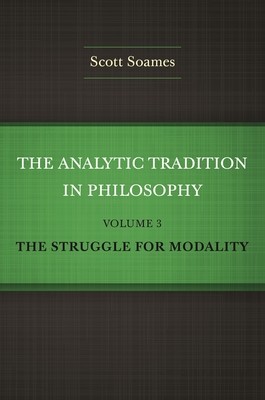
- We will send in 10–14 business days.
- Author: Scott Soames
- Publisher: Princeton University Press
- ISBN-10: 069116004X
- ISBN-13: 9780691160047
- Format: 15.8 x 23.6 x 3.3 cm, hardcover
- Language: English
- SAVE -10% with code: EXTRA
Reviews
Description
An in-depth history of modal logic in analytic philosophy, from a leading philosopher of language
This is the third of five volumes of a definitive history of analytic philosophy from the invention of modern logic in 1879 to the end of the twentieth century. Scott Soames, a leading philosopher of language and historian of analytic philosophy, provides the fullest and most detailed account of the analytic tradition yet published, one that is unmatched in its chronological range, topics covered, and depth of treatment. Focusing on the major milestones and distinguishing them from detours, Soames gives a seminal account of where the analytic tradition has been and where it appears to be heading. Volume 3 explains the most important achievement in the analytic tradition in the twentieth century--the rise and development of the epistemic and metaphysical modalities of necessity, possibility, and conceivability--and how it opened new vistas for the understanding of mind, meaning, and metaphysics. At the center of the story is Saul Kripke, who generated new modal systems and their open-ended philosophical applications, and his undergraduate teacher, W.V.O. Quine, who rejected the modalities plus our notions of linguistic meaning and reference. Part 1 traces the rise of modal logic from C. I. Lewis's unhappiness with Alfred North Whitehead and Bertrand Russell's Principia Mathematica, through Lewis's modal S-systems, Ruth Marcus's proof-theoretic quantified modal logic, Rudolph Carnap's Meaning and Necessity, and Kripke's logical and philosophical breakthrough. Part 2 chronicles Quine's rejection of meaning, necessity, synonymy, and reference. Part 3 assesses the philosophical framework provided by Kripke's Naming and Necessity, separating its revolutionary insights from its unsolved problems.EXTRA 10 % discount with code: EXTRA
The promotion ends in 19d.17:59:34
The discount code is valid when purchasing from 10 €. Discounts do not stack.
- Author: Scott Soames
- Publisher: Princeton University Press
- ISBN-10: 069116004X
- ISBN-13: 9780691160047
- Format: 15.8 x 23.6 x 3.3 cm, hardcover
- Language: English English
An in-depth history of modal logic in analytic philosophy, from a leading philosopher of language
This is the third of five volumes of a definitive history of analytic philosophy from the invention of modern logic in 1879 to the end of the twentieth century. Scott Soames, a leading philosopher of language and historian of analytic philosophy, provides the fullest and most detailed account of the analytic tradition yet published, one that is unmatched in its chronological range, topics covered, and depth of treatment. Focusing on the major milestones and distinguishing them from detours, Soames gives a seminal account of where the analytic tradition has been and where it appears to be heading. Volume 3 explains the most important achievement in the analytic tradition in the twentieth century--the rise and development of the epistemic and metaphysical modalities of necessity, possibility, and conceivability--and how it opened new vistas for the understanding of mind, meaning, and metaphysics. At the center of the story is Saul Kripke, who generated new modal systems and their open-ended philosophical applications, and his undergraduate teacher, W.V.O. Quine, who rejected the modalities plus our notions of linguistic meaning and reference. Part 1 traces the rise of modal logic from C. I. Lewis's unhappiness with Alfred North Whitehead and Bertrand Russell's Principia Mathematica, through Lewis's modal S-systems, Ruth Marcus's proof-theoretic quantified modal logic, Rudolph Carnap's Meaning and Necessity, and Kripke's logical and philosophical breakthrough. Part 2 chronicles Quine's rejection of meaning, necessity, synonymy, and reference. Part 3 assesses the philosophical framework provided by Kripke's Naming and Necessity, separating its revolutionary insights from its unsolved problems.

Reviews